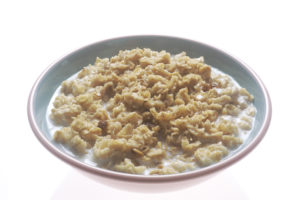 New research looked at people who "aged successfully" over a 10 year period compared with those who were "suboptimal agers" or had died. The successful agers were less likely to smoke, and have higher intakes of fiber from fruits, breads, and cereals (primarily from rolled oats and whole grain breads), but not from vegetables. Successful aging was defined as including an absence of disability, depressive symptoms, cognitive impairment, respiratory symptoms, and chronic diseases including cancer, coronary artery disease, and stroke. Fiber intake was more important for successful aging than glycemic index, glycemic load, carbohydrate intake, or sugar intake. From Medical Xpress:
New research looked at people who "aged successfully" over a 10 year period compared with those who were "suboptimal agers" or had died. The successful agers were less likely to smoke, and have higher intakes of fiber from fruits, breads, and cereals (primarily from rolled oats and whole grain breads), but not from vegetables. Successful aging was defined as including an absence of disability, depressive symptoms, cognitive impairment, respiratory symptoms, and chronic diseases including cancer, coronary artery disease, and stroke. Fiber intake was more important for successful aging than glycemic index, glycemic load, carbohydrate intake, or sugar intake. From Medical Xpress:
Dietary fiber intake tied to successful aging, research reveals
A new paper—published in The Journals of Gerontology, Series A: Biological Sciences and Medical Sciences by scientists from The Westmead Institute for Medical Research—reports that eating the right amount of fiber from breads, cereals, and fruits can help us avoid disease and disability into old age.
Using data compiled from the Blue Mountains Eye Study, a benchmark population-based study that examined a cohort of more than 1,600 adults aged 49 years and older for long-term sensory loss risk factors and systemic diseases, the researchers explored the relationship between carbohydrate nutrition and healthy aging.
They found that out of all the factors they examined—which included a person's total carbohydrate intake, total fiber intake, glycemic index, glycemic load, and sugar intake—it was the fiber that made the biggest difference to what the researchers termed "successful aging." Successful aging was defined as including an absence of disability, depressive symptoms, cognitive impairment, respiratory symptoms, and chronic diseases including cancer, coronary artery disease, and stroke.
"Out of all the variables that we looked at, fiber intake—which is a type of carbohydrate that the body can't digest—had the strongest influence," she said. "Essentially, we found that those who had the highest intake of fiber or total fiber actually had an almost 80 percent greater likelihood of living a long and healthy life over a 10-year follow-up. That is, they were less likely to suffer from hypertension, diabetes, dementia, depression, and functional disability."
While it might have been expected that the level of sugar intake would make the biggest impact on successful aging, Gopinath pointed out that the particular group they examined were older adults whose intake of carbonated and sugary drinks was quite low.
This study backs up similar recent findings by the researchers, which highlight the importance of the overall diet and healthy aging. In another study published last year in The Journals of Gerontology, Westmead Institute researchers found that, in general, adults who closely adhered to recommended national dietary guidelines reached old age with an absence of chronic diseases and disability, and had good functional and mental health status.
